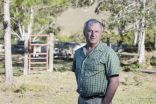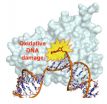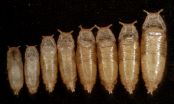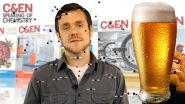Study supports free 'super Wi-Fi'
New frequency ranges may make free network access possible over long distances and relieve mobile communications networks -- Expected to trigger innovations
2014-11-25
(Press-News.org) This news release is available in German.
Wireless data transmission largely takes place via WLAN networks, such as WiFi. However, these networks are currently limited to high frequency ranges at 2 GHz and above and, hence, have a limited range. The authors of the study, Arnd Weber of the Institute for Technology Assessment and Systems Analysis (ITAS) of KIT and Jens Elsner, a former member of the staff of the KIT Communications Engineering Lab, propose to extend the frequencies for free communication to include lower ranges and even increased transmission power. These bands are being used less and less for the transmission of TV signals. They are highly suited for penetrating obstacles such as walls. Depending on the ambient conditions and by automatically adapting transmission power to prevent interference, such WLAN networks might even reach communication partners at a distance of several kilometers. Even in cities where the transmission capacity will be limited due to the large number of transmission stations, the range of wireless networks could be extended significantly. The networks could, for example, be made available to passersby on neighboring streets for transferring data to and from their smartphones.
"Implementation of our approach would have far-reaching consequences. Individuals, institutions, and companies would be far less dependent on expensive mobile communications networks in conducting their digital communication. This would also be of great economic benefit," according to Arnd Weber. Even the opening of existing WLAN frequencies in the last century demonstrated that users and companies utilized the new opportunities innovatively to develop new products. Examples besides wireless computer networks are wireless loudspeakers and cameras, remote controls for garage doors, transponders, baby phones, and Bluetooth.
According to Weber, however, a worldwide and broad debate about the approach is required because governments could also use the frequencies to extend the range of state-owned TV channels or auction them to mobile telephony providers at high prices. For this reason, Arnd Weber and Jens Elsner propose discussing their approach at the World Radiocommunication Conference (WRC). This conference, organized by the United Nations, will meet again next year and decides on the use of radio frequencies at the global level.
Study Contradicts Established Economic Theory
In accordance with the systems analysis approach used at ITAS, the study combines technical, social, and economic perspectives. Its conclusion that low frequency ranges should, as common property, be made available at no cost contradicts an established economic theory represented by, for instance, the economist and Nobel Prize winner Ronald Coase, who died in 2013. In his opinion, rights of use should be defined and sold on the market to achieve the optimal use of limited resources such as radio frequencies. According to the economist and political consultant Martin Cave, only the high GHz ranges where there is no risk of congestion should be opened to the public. Elsner and Weber show in their study, in contrast, how such congestion can be prevented technically. They argue that the low-cost approach to electronic communication should be given preference to intensive commercialization not only from the perspective of an individual, but also from that of the national economy. They suggest reserving a 90-MHz interval in the UHF bands. Apart from mobile communication for everyone, applications such as "program making and special events" technology might profit, for instance stage microphones and cameras, which could then transmit digitally instead of using niches of the TV spectrum with analogue technology. Use by disaster relief services is also conceivable.
Jens Elsner has meanwhile joined the Munich Innovation Group. Arnd Weber conducts research at the KIT Institute for Technology Assessment and Systems Analysis (ITAS). He is a member of the International Telecommunications Society. The study by Elsner and Weber is based on work performed under the startup project "User Networks," financed by funds from the Excellence Initiative at KIT.
INFORMATION:
Original publication:
Jens Elsner, Arnd Weber, Beachfront commons, Telecommunications Policy, Volume 38, Issues 8-9, Pages 709-714, (doi 10.1016/j.telpol.2014.05.003).
http://www.sciencedirect.com/science/article/pii/S030859611400086X
The Karlsruhe Institute of Technology (KIT) is a public corporation according to the legislation of the state of Baden-Württemberg. It fulfills the mission of a university and the mission of a national research center of the Helmholtz Association. Research activities focus on energy, the natural and built environment as well as on society and technology and cover the whole range extending from fundamental aspects to application. With about 9400 employees, including more than 6000 staff members in the science and education sector, and 24,500 students, KIT is one of the biggest research and education institutions in Europe. Work of KIT is based on the knowledge triangle of research, teaching, and innovation.
This press release is available on the internet at http://www.kit.edu.
[Attachments] See images for this press release:

ELSE PRESS RELEASES FROM THIS DATE:
2014-11-25
A higher surge of testosterone in competition, the so-called "winner effect," is not actually related to winning, suggests a new study of intercollegiate cross country runners.
The International Journal of Exercise Science published the research, led by David Edwards, a professor of psychology at Emory University, and his graduate student Kathleen Casto.
"Many people in the scientific literature and in popular culture link testosterone increases to winning," Casto says. "In this study, however, we found an increase in testosterone during a race regardless of the athletes' ...
2014-11-25
Anglers across the nation wondering why luck at their favorite fishing spot seems to have dried up may have a surprising culprit: a mine miles away, even in a different state.
Scientists at Michigan State University (MSU) have taken a first broad look at the impacts of mines across the country- and found that mining can damage fish habitats miles downstream, and even in streams not directly connected to the mines.
The work is published in this week's issue of the journal Ecological Indicators.
"We've been surprised that even a single mine in headwaters might influence ...
2014-11-25
Australian average incomes are falling with the country's population growth "masking underlying economic weakness", according to a QUT economist.
Dr Mark McGovern, a senior lecturer in QUT's Business School, said while it was regularly proclaimed Australia had experienced positive economic growth for more than 20 years, there had been periodic per capita declines, indicating the economy was not as healthy as assumed.
"Looking at national income figures in recent years shows our economy is under stress," Dr McGovern, whose research was recently published in the Economic ...
2014-11-25
Few agribusinesses or governments regulate the types of plants that farmers use in their pastures to feed their livestock, according to an international team of researchers that includes one plant scientist from Virginia Tech.
The problem is most of these so-called pasture plants are invasive weeds.
In a Proceedings of the National Academy of Sciences study this month, the scientists recommended tighter regulations, including a fee for damage to surrounding areas, evaluation of weed risk to the environment, a list of prohibited species based on this risk, and closer ...
2014-11-25
Using a new imaging technique, National Institutes of Health researchers have found that the biological machinery that builds DNA can insert molecules into the DNA strand that are damaged as a result of environmental exposures. These damaged molecules trigger cell death that produces some human diseases, according to the researchers. The work, appearing online Nov. 17 in the journal Nature, provides a possible explanation for how one type of DNA damage may lead to cancer, diabetes, hypertension, cardiovascular and lung disease, and Alzheimer's disease.
Time-lapse crystallography ...
2014-11-25
PHILADELPHIA (Nov. 25, 2014) - As the linked epidemics of obesity and diabetes continue to escalate, a staggering one in five U.S. adults is projected to have diabetes by 2050.
Ground zero for identifying ways to slow and stop that rise is Philadelphia, which has the highest diabetes rate among the nation's largest cities. For public health researchers at Drexel University, it is also a prime location to learn how neighborhood and community-level factors -- not just individual factors like diet, exercise and education-- influence people's risk.
A new Drexel study published ...
2014-11-25
PITTSBURGH, Nov. 24, 2014 -Barriers to the sharing of public health data hamper decision-making efforts on local, national and global levels, and stymie attempts to contain emerging global health threats, an international team led by the University of Pittsburgh Graduate School of Public Health announced today.
The analysis, published in the journal BMC Public Health and funded by the Bill & Melinda Gates Foundation and the National Institutes of Health (NIH), classifies and examines the barriers in order to open a focused international dialogue on solutions.
"Data on ...
2014-11-25
The proper regulation of body size is of fundamental importance, but the mechanisms that stop growth are still unclear. In a study now published in the scientific journal eLife*, a research group from Instituto Gulbenkian de Ciência (IGC), led by Christen Mirth, shed new light on how animals regulate body size. The researchers uncovered important clues about the molecular mechanisms triggered by environmental conditions that ultimately affect final body size. They show that the timing of synthesis of a steroid hormone called ecdysone is sensitive to nutrition in the ...
2014-11-25
People's views on income inequality and wealth distribution may have little to do with how much money they have in the bank and a lot to do with how wealthy they feel in comparison to their friends and neighbors, according to new findings published in Psychological Science, a journal of the Association for Psychological Science.
"Our research shows that subjective feelings of wealth or poverty motivate people's attitudes toward redistribution, quite independently of objective self-interest," says psychological scientist and study co-author Keith Payne of the University ...
2014-11-25
WASHINGTON, Nov. 25, 2014 -- Your beer may attract annoying fruit flies, but listen up before you give them a swat. Researchers found the yeast cells in beer are producing odor compounds -- acetate esters -- that lure flies and that could lead to the best beer you haven't even tasted yet. This week's Speaking of Chemistry explains why. Check it out at http://youtu.be/HQNlGuZvCvA.
Speaking of Chemistry is a production of Chemical & Engineering News, a weekly magazine of the American Chemical Society. The program features fascinating, weird and otherwise interesting chemistry ...
LAST 30 PRESS RELEASES:
[Press-News.org] Study supports free 'super Wi-Fi'
New frequency ranges may make free network access possible over long distances and relieve mobile communications networks -- Expected to trigger innovations






